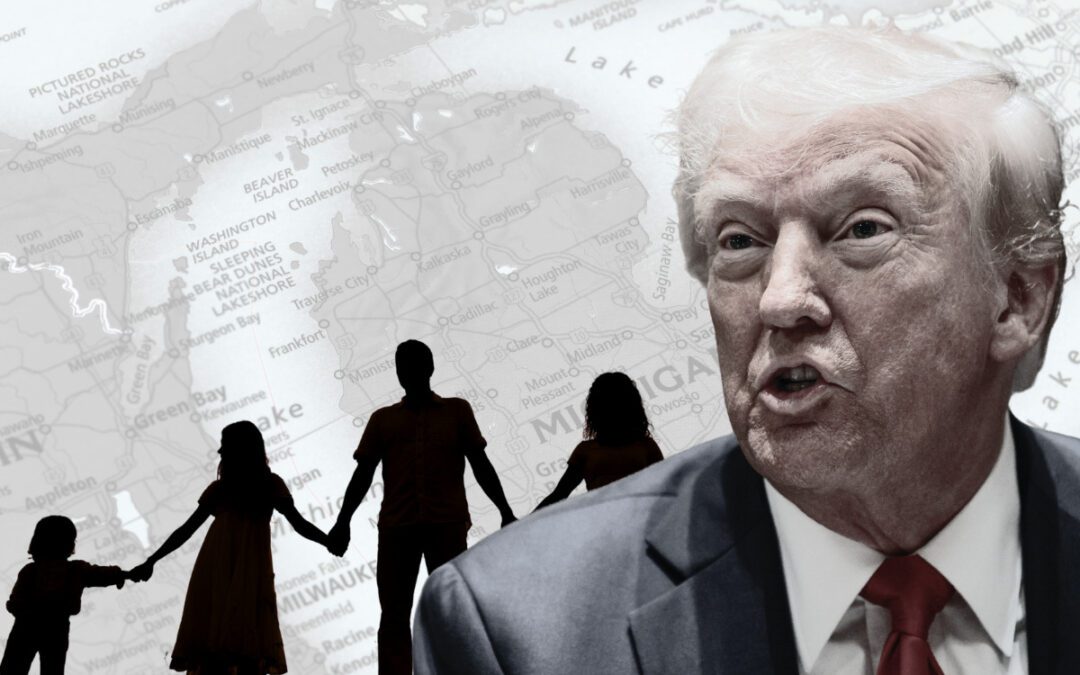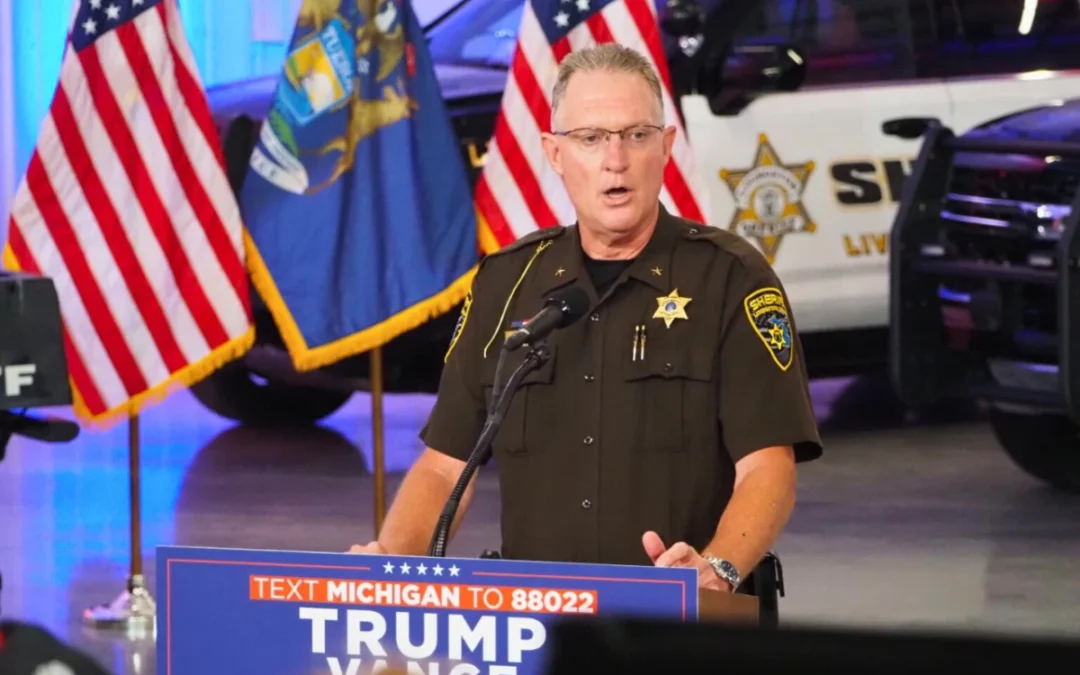
James Renner at the witness stand in 54-A District Court in Lansing, on Feb. 14. (Anna Liz Nichols/Michigan Advance)
BY ANNA LIZ NICHOLS, MICHIGAN ADVANCE
MICHIGAN—James Renner testified Wednesday that he never believed he and 15 other individuals who signed documents claiming to be Michigan’s state electors with fake electoral votes in 2020 engaged in any illegal activity.
Renner, 77, was charged alongside 15 others by the Michigan Attorney General’s Office with several felonies, accused of fraudulently submitting fake electoral votes for former President Donald Trump to the U.S. Senate and National Archives. However, Renner had his charges dropped in October as part of a cooperation agreement with the Attorney General’s Office, for which he offered testimony in a Lansing court Wednesday.
“The individuals … were all conscientious individuals,” Renner said, clarifying that he never intended any illegal action saying, “We were told this was an appropriate process.”
The 15 individuals facing charges are split into two groups for court proceedings, the Wednesday group includes two high-profile leaders in the Republican Party: Michigan GOP National Committeewoman Kathleen Berden and former Michigan GOP Co-Chair Meshawn Maddock. Other defendants in this group are Mari-Ann Henry, John Haggard, Amy Facchinello and Michele Lundgren.
Renner didn’t clarify who told the group that they were engaging in normal lawful behavior at the Dec. 14, 2020, meeting where the individuals charged met up at the Michigan Republican Party headquarters in Lansing. At this meeting, they signed documents saying they, as the rightful electors of Michigan cast the state’s electoral votes for former President Donald Trump. However, lawyers for the defense have argued that potentially individuals didn’t know what they were signing, defeating the intent to commit fraud.
Because President Joe Biden had won Michigan by more than 154,000 votes, the Democratic panel of electors were the rightful group to submit the state’s electoral votes. But conspiracies over election fraud, spearheaded by Trump, led many in the state of Michigan to question and deny the integrity of the 2020 election.
Renner testified that he was told that should the election be overturned and Trump be determined to have won the 2020 presidential election, the paperwork he signed would ensure that the appropriate partisan electors would be counted and Michigan could submit its votes for Trump.
There was zero talk, to his knowledge, on Dec. 14, 2020, at the meeting where the documents were signed that the group was attempting anything illegal or attempting to defraud peoples’ votes, Renner said. If there was, he would have left due to his beliefs as a retired member of law enforcement.
Renner said seven years in law enforcement, including time with the Michigan State Police providing security for the Michigan State Capitol, instilled him with a respect for the law.
“It’s the foundation of this country,” Renner said.
Maddock’s lawyer, Nicholas Somberg, referenced a group photo members of the group took on the same day in Lansing asking Renner if in his experience in enforcement if individuals engaging in criminal activity typically take group photos as crimes are being committed, to the laughter of defendants and the judge. The photo was taken the day Renner and others in a group approached the Michigan State Capitol building to submit false electoral votes while the building was closed due to threats of violence.
Renner said the group had been told that if they presented their documents as the Republican electors, lawmakers had the ability to accept their slate.
Garett Koger, a lawyer on Berden’s defense, said the state’s case will ultimately fail to show any criminal action by members of the charged group, adding that the documents were part of a “larger plan that originated” with Kenneth Chesebro.
Chesebro, former attorney for Trump, pleaded guilty in Fulton County, Ga., Superior Court in October to a felony charge after he admitted to orchestrating a multi-state fake elector plot to present fake elector documents in favor of a Trump presidency.
Although Chesebro pleaded guilty to a crime for his role in the plot, Koger said Chesebro’s testimony in Michigan later in the preliminary exam will show Chesebro had an understanding of a 1960 case out of Hawaii where there was a recount in the presidential election and both party’s electors submitted electoral votes pending the recount which did reverse Hawaii’s pick for president.
For Hawaii, the difference in votes between candidates was around 100 votes, Michigan’s was more than 150,000. The electors in Hawaii acted pending the result of an official statewide recount and there was no official statewide recount in Michigan.
The preliminary exams will continue in the coming weeks as the court schedules with the defense of the various defendants.
READ MORE: How Donald Trump’s army tried—and failed—to steal a presidential election in Michigan
This coverage was republished from Michigan Advance pursuant to a Creative Commons license.

Opinion: The America my parents believed in is disappearing
Michigan State Rep. Mai Xiong reflects on the fear Trump's immigration policies are causing for Michigan families. Last November, I wrote in the...

Activists, officials call for closure of Ottawa County coal plant as utility looks to recover costs
BY SARAH LEACH, MICHIGAN ADVANCE OTTAWA COUNTY—“We are standing here today to stand up to the Trump Administration to tell them, ‘Get this coal...

MAGA Michigan sheriff faces new criticism for politicking with official resources
BY BEN SOLIS, MICHIGAN ADVANCE MICHIGAN—Livingston County Sheriff Mike Murphy, who’s also running for the Michigan Senate, held a political...

Michigan disability advocates slam cuts to SNAP and Medicaid as attacks on autonomy
BY KYLE DAVIDSON, MICHIGAN ADVANCE LANSING—Standing before the Michigan State Capitol on Tuesday, a group of disability self-advocates took Congress...

7 Michigan Republicans vote to help Trump gut health care for 200,000 Michiganders
Michiganders are bracing for consequences after President Donald Trump signed Republican-led legislation to cut federal funding for Medicaid. ...



